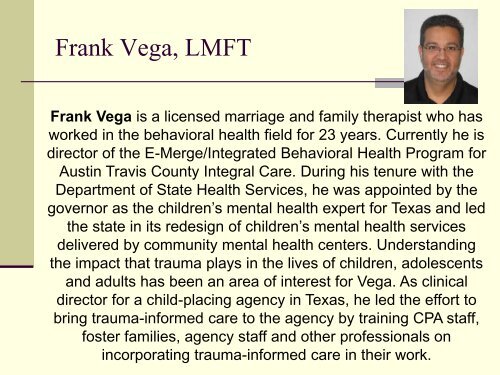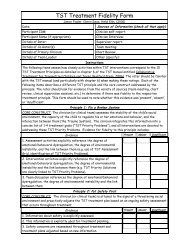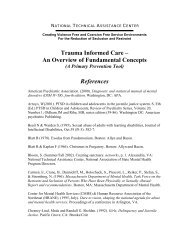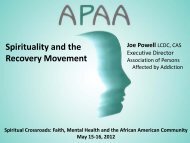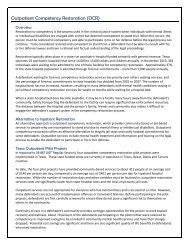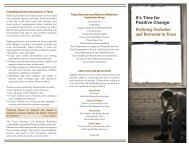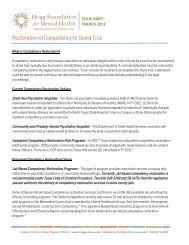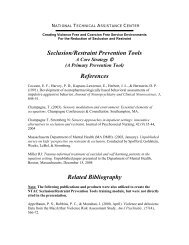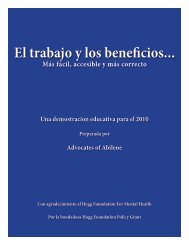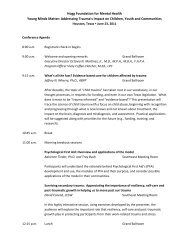Frank Vega, LMFT - Hogg Foundation for Mental Health
Frank Vega, LMFT - Hogg Foundation for Mental Health
Frank Vega, LMFT - Hogg Foundation for Mental Health
Create successful ePaper yourself
Turn your PDF publications into a flip-book with our unique Google optimized e-Paper software.
<strong>Frank</strong> <strong>Vega</strong>, <strong>LMFT</strong><br />
<strong>Frank</strong> <strong>Vega</strong> is a licensed marriage and family therapist who has<br />
worked in the behavioral health field <strong>for</strong> 23 years. Currently he is<br />
director of the E-Merge/Integrated Behavioral <strong>Health</strong> Program <strong>for</strong><br />
Austin Travis County Integral Care. During his tenure with the<br />
Department of State <strong>Health</strong> Services, he was appointed by the<br />
governor as the children’s mental health expert <strong>for</strong> Texas and led<br />
the state in its redesign of children’s mental health services<br />
delivered by community mental health centers. Understanding<br />
the impact that trauma plays in the lives of children, adolescents<br />
and adults has been an area of interest <strong>for</strong> <strong>Vega</strong>. As clinical<br />
director <strong>for</strong> a child-placing agency in Texas, he led the ef<strong>for</strong>t to<br />
bring trauma-in<strong>for</strong>med care to the agency by training CPA staff,<br />
foster families, agency staff and other professionals on<br />
incorporating trauma-in<strong>for</strong>med care in their work.
Children affected by trauma:<br />
What works – and what doesn’t<br />
Tools <strong>for</strong> working with children and<br />
adolescents with traumatic histories
Trauma’s Impacts<br />
• Attachment<br />
• Lack of trusting, protective relationships<br />
• Boundary Issues<br />
• Social Isolation<br />
• Biology<br />
• Neurological Impact<br />
• Hypersensitivity<br />
• Somatic Complaints<br />
• Behavioral<br />
• Impulse Control<br />
• Sleep Disturbances<br />
• Self Destructive Behaviors
Trauma’s Impacts<br />
• Cognitive Abilities<br />
• Learning Related Issues<br />
• Inability of Focus<br />
• Language Development<br />
• Detachment<br />
• Mood<br />
• Emotional Dysregulation<br />
• Depressed<br />
• Sense of Self<br />
• Low Self-Esteem<br />
• Shame<br />
• Guilt
Adverse Childhood Experiences (ACE) Study<br />
•Division of Adult and Community <strong>Health</strong>, National Center <strong>for</strong> Chronic Disease Prevention and<br />
<strong>Health</strong> Promotion<br />
www.acestudy.org
Assessment of Need<br />
• Family Assessment<br />
• Safety Assessment<br />
• Assess all areas impacted<br />
• Psychological/Behavioral<br />
• Development<br />
• Identification of treatment needs<br />
• Don’t start until the child is ready
Assessments<br />
• Adolescent Clinical Sexual Behavior<br />
Inventory-Parent Report<br />
• Adolescent Clinical Sexual Behavior<br />
Inventory-Self Report<br />
• Attachment Questionnaire <strong>for</strong><br />
Children<br />
• Beck Anxiety Inventory<br />
• Beck Depression Inventory-Second<br />
Edition<br />
• Child PTSD Symptom Scale<br />
• Child Report of Post-traumatic<br />
Symptoms<br />
• Child Sexual Behavior Inventory<br />
• Child's Reaction to Traumatic<br />
Events Scale-Revised<br />
• Children's PTSD Inventory<br />
• Clinician-Administered PTSD Scale<br />
<strong>for</strong> Children and Adolescents <strong>for</strong> the<br />
DSM-IV<br />
• Post Traumatic Symptom Inventory<br />
<strong>for</strong> Children<br />
• Posttraumatic Stress Disorder<br />
Semi-Structured Interview and<br />
Observational Record<br />
• PTSD in Preschool Aged Children<br />
• Response to Childhood Incest<br />
Questionnaire<br />
• Trauma and Attachment Belief<br />
Scale<br />
• Trauma Symptom Checklist <strong>for</strong><br />
Children<br />
• Trauma Symptom Checklist <strong>for</strong><br />
Young Children<br />
• Trauma Symptom Inventory<br />
• Violence Exposure Scale <strong>for</strong><br />
Children-Revised
Purpose of Trauma Assessments<br />
• Development of Treatment Plan<br />
• Assessment of trauma’s impact<br />
• Re-evaluation of treatment<br />
• What worked<br />
• What didn’t<br />
• Have symptoms decreased/increased<br />
• Child’s sense of safety<br />
• How often to re-evaluate<br />
• Outcomes
Assessment of Need<br />
• Adolescent Clinical Sexual Behavior<br />
Inventory-Parent Report<br />
• Adolescent Clinical Sexual Behavior<br />
Inventory-Self Report<br />
• Attachment Questionnaire <strong>for</strong><br />
Children<br />
• Beck Anxiety Inventory<br />
• Beck Depression Inventory-Second<br />
Edition<br />
• Child PTSD Symptom Scale<br />
• Child Report of Post-traumatic<br />
Symptoms<br />
• Child Sexual Behavior Inventory<br />
• Child's Reaction to Traumatic<br />
Events Scale-Revised<br />
• Children's PTSD Inventory<br />
• Clinician-Administered PTSD Scale<br />
<strong>for</strong> Children and Adolescents <strong>for</strong> the<br />
DSM-IV<br />
• Post Traumatic Symptom Inventory<br />
<strong>for</strong> Children<br />
• Posttraumatic Stress Disorder<br />
Semi-Structured Interview and<br />
Observational Record<br />
• PTSD in Preschool Aged Children<br />
• Response to Childhood Incest<br />
Questionnaire<br />
• Trauma and Attachment Belief<br />
Scale<br />
• Trauma Symptom Checklist <strong>for</strong><br />
Children<br />
• Trauma Symptom Checklist <strong>for</strong><br />
Young Children<br />
• Trauma Symptom Inventory<br />
• Violence Exposure Scale <strong>for</strong><br />
Children-Revised
What works with Traumatized kids?<br />
• Alternatives <strong>for</strong> Families-A Cognitive<br />
Behavioral Therapy (AF-CBT)<br />
• Adapted Dialectical Behavior Therapy<br />
<strong>for</strong> Special Populations (DBT-SP)<br />
• Assessment-Based Treatment <strong>for</strong><br />
Traumatized Children: Trauma<br />
Assessment Pathway (TAP)<br />
• Attachment, Self-Regulation, ad<br />
Competence (ARC): A Comprehensive<br />
Framework <strong>for</strong> Intervention with<br />
Complexly Traumatized Youth<br />
• Child Adult Relationship Enhancement<br />
(CARE)<br />
• Child-Parent Psychotherapy (CPP)<br />
• Cognitive Behavioral Intervention <strong>for</strong><br />
Trauma in Schools (CBITS)<br />
• Combined Parent Child Cognitive-<br />
Behavioral Approach <strong>for</strong> Children ad<br />
Families At-Risk <strong>for</strong> Child Physical<br />
Abuse<br />
• Culturally Modified Trauma-Focused<br />
Treatment (CM-TFT)<br />
• International Family Adult and Child<br />
Enhancement Services (IFACES)<br />
• Integrative Treatment of Complex<br />
Trauma (ITCT)<br />
• Multimodality Trauma Treatment –<br />
Trauma-focused Coping (MMTT)<br />
• Parent-Child Interaction Therapy<br />
(PCIT)<br />
• Real Life Heroes (RLH)<br />
• Sanctuary Model<br />
• Structured Psychotherapy <strong>for</strong><br />
Adolescents Responding to Chronic<br />
Stress (SPARCS)<br />
• Trauma Grief Component Therapy <strong>for</strong><br />
Adolescents TGCT-A<br />
• Trauma Affect Regulation: Guidelines<br />
<strong>for</strong> Education ad Therapy <strong>for</strong><br />
Adolescents And Pre-Adolescents<br />
(TARGET-A)<br />
• Trauma-Focused Cognitive Behavioral<br />
Therapy (TF-CBT)<br />
• Trauma-Focused Cognitive Behavioral<br />
Therapy <strong>for</strong> Childhood Traumatic Grief<br />
(TFCBT-CTG)<br />
• Trauma Systems Therapy (TST)
Alternatives <strong>for</strong> Families-A Cognitive<br />
Behavioral Therapy (AF-CBT)<br />
• Physically abused children and offending<br />
caregivers<br />
• Phase 1: Psychoeducation and Engagement<br />
• Phase 2: Individual and Family Skills Training<br />
• Phase 3: Family Applications<br />
• Key Components<br />
• Working with the Child<br />
• Working with the Caregiver<br />
• Family Systems
Trauma-Focused Cognitive Behavioral Therapy<br />
(TF-CBT)<br />
• PRACTICE<br />
• Psycho-education<br />
• Relaxation skills<br />
• Affective modulation<br />
• Cognitive coping<br />
• Trauma narrative<br />
• Conjoint parent-child sessions<br />
• Enhancing future personal safety
Attachment, Self-Regulation, and<br />
Competency (ARC)<br />
• ARC is a guideline not a manualized<br />
intervention<br />
• Attachments<br />
• Strengthening Self Regulation<br />
• Developing Competencies within the child<br />
http://www.traumacenter.org/
10 building blocks of ARC<br />
• Attachment<br />
• Caregiver<br />
Affect<br />
Management<br />
• Attunement<br />
• Consistent<br />
Response<br />
• Routines and<br />
Rituals<br />
• Self-Regulation<br />
• Affect<br />
Identification<br />
• Affect<br />
Modulation<br />
• Affect<br />
Expression<br />
• Competency<br />
• Developmental<br />
Tasks<br />
• Executive<br />
Functions<br />
• Self<br />
Development<br />
http://www.traumacenter.org/
References and Resources<br />
• National Child Traumatic Stress Network<br />
• www.nctsn.org<br />
• www.learn.nctsn.org<br />
• www.nctsnet.org/products/child-welfare-trauma-training-toolkit-2008<br />
• Division of Adult and Community <strong>Health</strong>, National Center <strong>for</strong> Chronic Disease<br />
Prevention and <strong>Health</strong> Promotion<br />
• http://www.cdc.gov/ace/index.htm<br />
• ACE Study<br />
• www.acestudy.org<br />
• Trauma Systems Therapy<br />
• http://traumasystemstherapy.wordpress.com/<br />
• US Department of Veteran’s Affairs National Center <strong>for</strong> PTSD<br />
• www.ptsd.va.gov/index.asp<br />
• National Child Traumatic Stress Network Empirically Supported Treatments and<br />
Promising Practices:<br />
• www.nctsnet.org/nccts/nav.do?pid=ctr_top_trmnt_prom<br />
• The Chadwick Center<br />
• http://www.chadwickcenter.org/
• Cali<strong>for</strong>nia Evidence-Based Clearinghouse <strong>for</strong> Child Welfare<br />
• www.cachildwelfareclearinghouse.org<br />
• Attachment, Self-Regulation and Competency (ARC)<br />
• http://www.traumacenter.org/<br />
• Treating Traumatic Stress in Children and Adolescents: How to Foster<br />
Resilience through Attachment, Self-Regulation, and Competency<br />
Margaret E. Blaustein PhD, Kristine M. Kinniburgh LICSW
CEU Statement<br />
Copyright 2005<br />
Medical University of South Carolina<br />
All Rights Reserved


